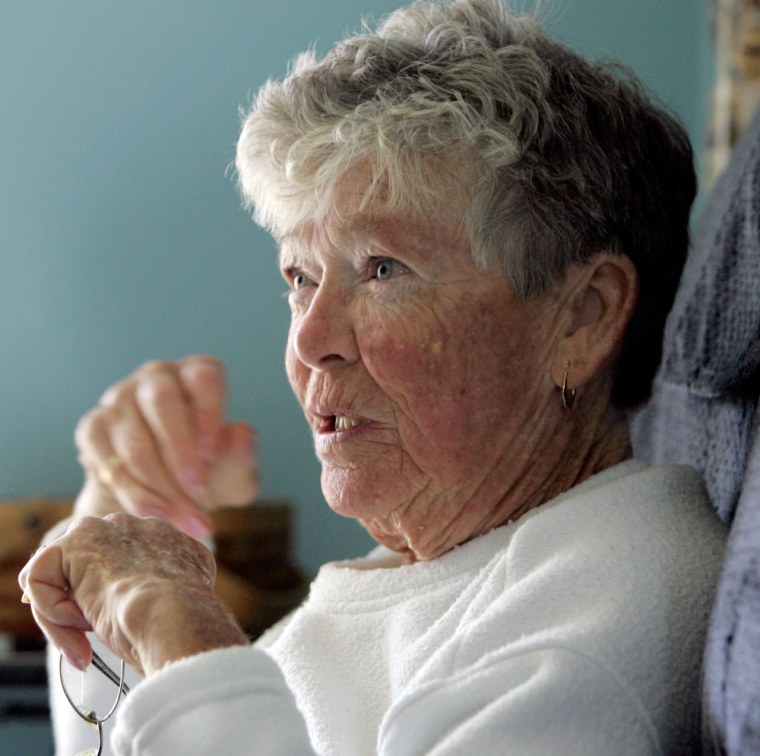Bob and Clare James had to be removed by a SWAT team from their retirement community after 2005's Hurricane Wilma.
The elderly couple stayed behind because they didn't know where else to go and had no one to guide them. And they weren't the only ones — a 100-year-old neighbor was in bed when the roof of his condo collapsed on him.
"We didn't think it was going to be that bad," Clare James said.
Florida officials say they've learned from past hurricane seasons — and highly publicized failures elsewhere — to improve their assistance to the state's 4.2 million seniors. This year, the Florida Department of Elder Affairs and counties throughout the state are readying rapid response teams to visit the elderly and deliver clothing, food, ice and water in cases of emergencies.
The agency is also working to assist county governments in setting up special shelters, telephone help lines and improved communication systems.
"We humbly say we're the best because we are so well experienced because of so many storms that affect our coastlines. We are just a seasoned team," said Fran Brooks, who is in charge of emergency operations and disaster preparedness for the department.
Nursing homes a weak point
The needs of the elderly in disasters can be life-endangering, and too often overlooked. According to some estimates, nursing home residents accounted for almost 10 percent of the more than 1,400 deaths blamed on Katrina in Louisiana. Only 21 of the 57 nursing homes considered at risk during Katrina evacuated, authorities said.
"Lessons learned: Prepare, evacuate, know where you are going to go," Margaret McGarity, program manager at the Office of Elder Affairs in Baton Rouge, said of the aftermath of Hurricane Katrina. "That was probably the biggest lesson, was being prepared."
For the Florida plan, Brooks said officials discussed best practices with other states, such as Mississippi and Texas, where those with special needs can register with the state so that officials know where they are before an evacuation or an emergency.
But for all the planning, the state did not come up with one unified approach.
Rapid response teams would be dispatched after a storm to deliver food, water and ice — but they are being signed up by each county, and would respond to the county's requests. There's no tally of how many teams are set to respond, but the Palm Beach and Treasure Coast Area Agency on Aging has signed up about 100 volunteers.
Elderly people must also plan for their evacuations themselves. If there are special transport needs, the county may have the ability to help. Elderly people can call a helpline to see what's available.
"All disasters are local," Brooks said. "We don't tell communities what they have to do. We are there to assist them in identifying the need and developing the response."

Retirement complex now supply site
For the Boynton Beach community, that meant the seniors worked with county officials to have the Village Royale retirement complex where the Jameses live designated as a community supply distribution site, which means food and water will get in as soon as it's available after a hurricane.
"We don't want anybody to live through what we went through," said Sam Marks, a former president of the community's owners association. "For most of us, it's our last stop in life."
Part of the mission is educating seniors on how to plan, develop phone lists and stock supplies. Volunteers would also deliver food, water and ice, and the local Agency on Aging is distributing door hangers that elders can place outside to tell neighbors whether anyone inside needs help.
Elsewhere, officials have focused on getting seniors evacuated or into proper shelters. Alabama recently opened its first safe center, which is a senior center that can withstand hurricane winds in an emergency.
North Carolina recently developed a new hurricane evacuation plan, which includes tips on evacuating the elderly and designating meeting areas and voluntary rosters so rescuers can know where to find them. South Carolina is also encouraging elderly people to register with the county, said Joe Farmer, a spokesman for the state's Emergency Management Division.
Florida's Broward County set up an elderly helpline where people can call in and find out how to prepare and where to go in case of need. Trying to get people prepared for the first 72 hours is the goal.
"The biggest problem is that people believe it is never going to happen to them," said Edith Lederberg, executive director of the Aging and Disability Resource Center of Broward County.
